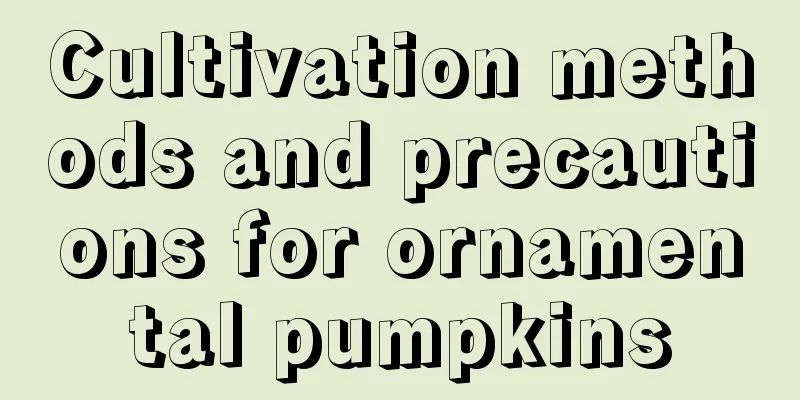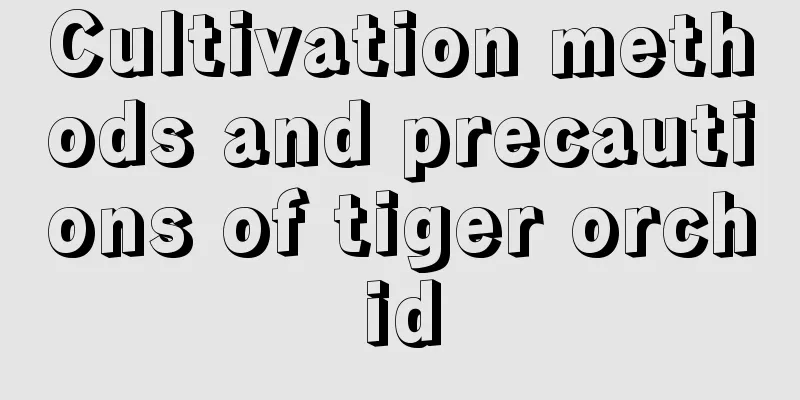Cultivation methods and precautions for ornamental pumpkins

1. Maintenance methods1. Temperature: Pumpkin likes to grow in a relatively warm environment. It can grow normally in an environment of 15-35℃. However, 25-28℃ is the most suitable temperature for its growth. It should be kept indoors in early spring and moved out after the temperature warms up. 2. Water: When it is a seedling, it needs to be watered every day or every other day to keep it moist. When it comes to the fruit-bearing period, water evaporates quickly and more water is needed, so it needs to be watered about 2 or 3 times a day. 3. Soil: The best soil for growing pumpkins is humus and charcoal. The soil prepared in this way has better drainage and air permeability. In addition, the humus in the soil can provide it with the nutrients needed for growth. 4. Light: Pumpkins prefer a growing location with good light, but in the summer, they still need proper shade to avoid sunburn of the leaves and excessive evaporation of water. It is best to allow it to receive sufficient light every day in winter. 2. Breeding techniques1. Pruning: Generally, the fruits of ornamental pumpkins are relatively small. You can cut off all the side branches except the main branches, leaving only one main vine for fruiting. This makes it very convenient to set up a frame. 2. Build a trellis: For fruit-bearing vine plants like this one, it is best to build a trellis to facilitate fruiting. Select three bamboo poles to build the frame, tie them together at the top and separate the bottom ends to form a tripod. The bottom can be buried in the soil to make it easier to fix, and then the pumpkin vines can be placed on it. 3. Problem diagnosis and treatment1. Yellow leaves: The yellowing of ornamental pumpkin leaves is usually caused by excessive watering. Its roots remain in a damp state for a long time and become rotten, and eventually the entire plant will turn yellow and die. You can water less at ordinary times, and wait until the soil is completely dry before watering again, which will also facilitate greater absorption. 2. Powdery mildew: This is a common disease of pumpkin. When the disease occurs, a white substance like frost will appear on the leaves. It is necessary to spray with 600 times diluted triadimefon as soon as possible to achieve the effect of prevention and control. IV. Other issues1. Is it edible? Ornamental pumpkins are edible, but their taste is not very good. It is not as good as edible pumpkins. It is just for viewing and there is no need to eat it. 2. Can it be grown indoors: Ornamental pumpkins can be grown indoors, but considering the issue of pollination, it is recommended to grow them outdoors. If you know how to use a brush to pollinate, it is fine to grow it indoors. |
<<: Cultivation methods and precautions of pink vine
>>: Cultivation methods and precautions of flame euonymus
Recommend
Primrose cultivation methods and precautions
1. Breeding methods 1. Soil: The soil needs to be...
The most heat-resistant indoor plants are suitable for indoor heat-resistant evergreen plants
There are many cold-resistant flowers and plants ...
Can Osmanthus trees be planted in Beijing?
Can Osmanthus trees be planted in Beijing? Sweet ...
What should I do if the core of the peony flower turns black?
Reason 1: Lack of water Solution: Improve waterin...
The benefits of milk for growing flowers
Milk as fertilizer Milk is rich in nutrients, inc...
How to water glass jade? Pay attention to these four points!
Glass Jade Watering Method The soil of the glass ...
What to do if the money tree has root rot? How to save it
1. Remove from the basin When the roots of the mo...
How to water hyacinth
Hyacinth watering tips Hyacinth is native to the ...
The flower language of osmanthus, when does osmanthus bloom
1. Flower Language 1. Harvest: Its flowers usuall...
Can fig pruning survive? Time and method of branch cuttings
Can fig cuttings survive by grafting? Fig cutting...
How to repot and transplant white palm
1. Time to change pots White calla lilies grow re...
Can I plant green radish in the soil of succulent plants? Can I plant them together?
1. Can you grow green radish in succulent soil? T...
What are the cultivation methods and precautions for rose potted plants?
Rose Introduction Roses belong to the Rosaceae fa...
What kind of pot is good for red maple
What kind of pot is good for growing red maple Re...
How many Polygonatum sibiricum plants are planted per acre?
Polygonatum sibiricum planting spacing How many P...









